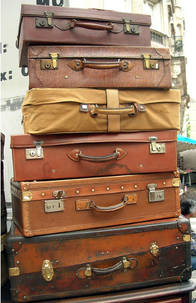
Mr Anyia is gone but certainly not forgotten, Mrs Anyia wears a photo of him on her commemorative t-shirt and his absence is made tangible by an empty leather chair in the corner of the room. No-one is allowed to sit on the chair as it has not “even been up to a year” since he died.
I have seen Ellen Thomas in many things over the years (Eastenders and, more enjoyably for me, Teachers) and she is a great comedy actress. In the first scene she set up the feel for the play as she packed the mountainous piles of clothes, nappies and a steering wheel, throwing herself on top of the suitcase in a vain attempt to make it shut. Mrs Anyia will not give up and ropes in Grace (played by Rhoda Ofori-Attah) to help.
Grace is the daughter still at home with her husband (played by Nick Oshikanlu) who has a touch of failure about him, even if he has his tracksuit ‘business’ that Grace has invested her money in. In contrast to Grace and her Nigerian husband is her single barrister sister Anne (played by Anniwaa Buachie) this dynamic is where the meat of Egusi Soup lies.
Anne and Grace are shown to have accepted different elements of their culture, while Grace has married a Nigerian man and tends to slip into a Nigerian accent when she talks to him and her mother, Anne tries to talk as prim, proper and English as she can. The thought of going on this trip to Lagos makes her reel at the thought of the ‘uncivilised’ not to mention the ‘uneducated’. There is hostility between the sisters due to this and Anne’s absence from important family events but there are sincere moments of closeness between them. The two slip into warm humour from their chilly arguments and the comedy they bring to this play are the most enjoyable and say the most about the extremes of family relationships.
Egusi Soup uses these two young women to demonstrate the expectations on Nigerian women to be married, mothers and not to have a mouth on them like Anne! These issues are addressed from the dinner table to the bedroom. The bedroom is the place where my favourite scene took place. I’m not going to give away what happens in the dead of night in the living room! The visual comedy throughout Egusi soup and the punch-lines delivered with them are a winning combination and this is just one of many.
Dele’s character, as well as Mr Emmanuel, pushes forward the male Nigerian roles. There were definitely some jokes that were cultural that did go over my head but anyone can relate to the Preacher directing prayer and anointments down the phone and asking the caller to text him back tomorrow. Lace Akpojaro works perfectly with everyone he is put on stage with, be it the suspicious daughter or the bubbly Mrs Anyia.
Egusi Soup starts off on a low heat but warms up into a tasty dish of fun and affection. The baggage gets packed but everything else is pulled out of this family for the audience to see.
If you come to see this play at Soho Theatre make sure you get a seat in the front row or the raised seating area. I could have kicked myself for sitting in the 3rd row (my middle row, middle seats cinema mantra doesn’t work for the stage!) I missed out as I couldn’t see everything. The set stretches from wall to wall and you need to see every expression and motion the characters make to get the full effect.
Egusi Soup is on at Soho TheatreFrom 23rd May to 9th June
Squeamish Nicola
 RSS Feed
RSS Feed
